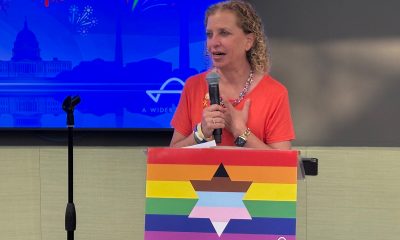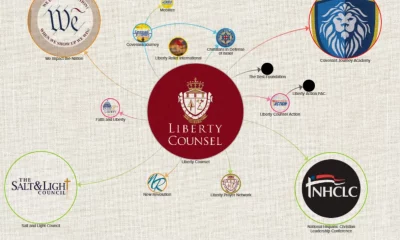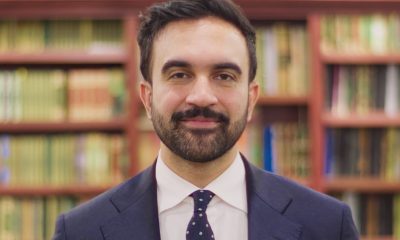Middle East
‘This wedding is both defiance and pride’
IDF reservist married partner in Ein Yahav on Nov. 22
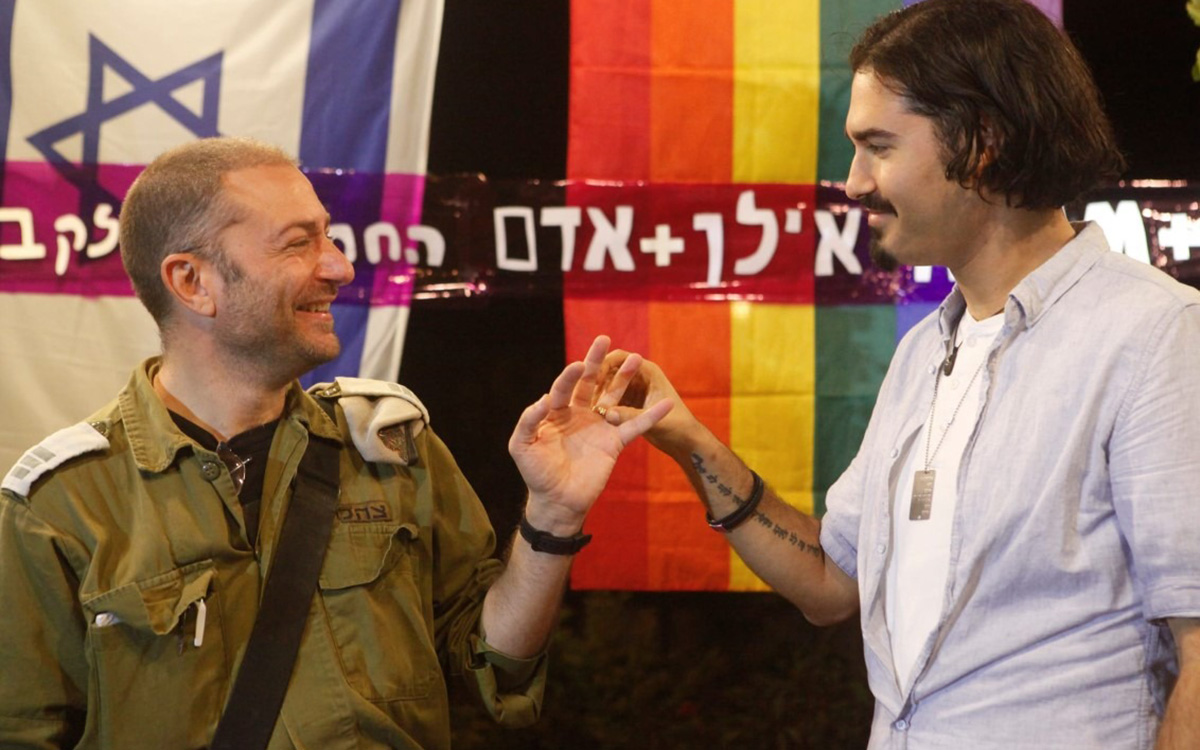
WDG is the Washington Blade’s media partner in Israel. This article ran on WDG’s website on Nov. 23.
Among dozens of reservists who became a family, with a spontaneous canopy at the B&B in Ein Yahav and refreshments donated with much love from Eilat businesses and residents, Adam Din and Ilan Cohen held their wedding ceremony Nov. 22.
“We did this wedding because it is important to us that the world knows that there is love even in the middle of the war and that we can celebrate love as well through it all,” said the couple.
Adam and Ilan’s wedding was scheduled to take place about two weeks ago on the beach between Ashdod and Nitzanim. The invitations were already prepared, but the terrible massacre on Oct. 7, and the war that broke out in its wake, postponed all their plans.
Ilan was immediately drafted into the reserves in the Gaza Division, leaving Adam alone at home. Nati Harosh, the couple’s best friend who was supposed to be the groomsman at the wedding, was also drafted into the reserves as a Givati Brigade fighter.
“We were supposed to get married on the beach,” says Adam, “The war postponed the wedding, and also took Nati.”
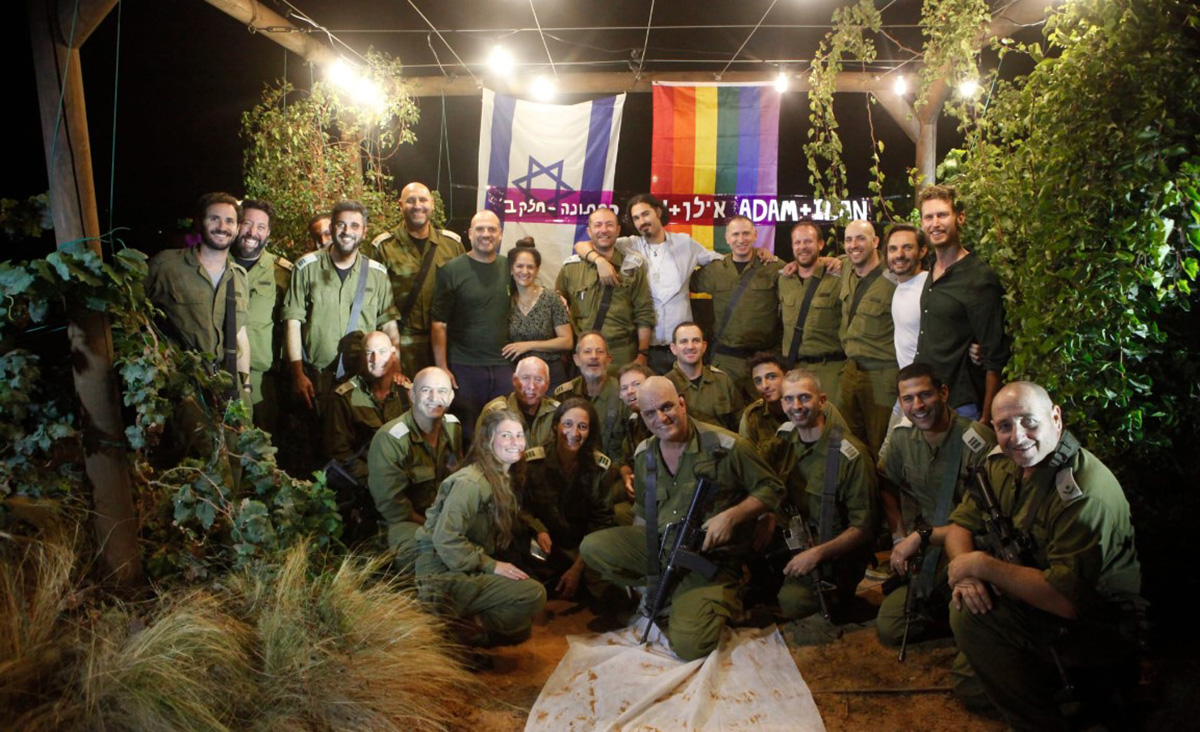
Adam and Ilan met a year and eight months ago.
“We met on Tinder, not for a serious purpose,” says Adam. “After we met, Ilan introduced me to a group of travelers from the gay community and we used to go on trips together. Over time we got to know each other more and more and in an organic and natural way we became together. It never had an official date.”
The short acquaintance was very significant for both of them.
“I was in the closet in front of the family before I met Ilan, and also childfree. And getting to know Ilan changed me completely,” says Adam. “I came out in front of my family and introduced them to Ilan, and I also decided that I wanted us to become parents together. My life changed thanks to him and we are really a family.”
The first friend Adam introduced to Ilan was Nati.
“Nati is a friend of mine from the time I lived in Jerusalem during my internship. We met through mutual friends and became very close friends. Nati was a giving person, like the meaning of his name Nathaniel. One of those people who were untouched by the cruelty of the world. Always ready to help. Doesn’t hold a grudge even when he is treated badly, and I would get angry for him and he wouldn’t get angry,” says Adam.
“Nati’s move from Jerusalem to Ramat Gan was one of the reasons that led us to move there as well, and since then we have been at each other’s house a lot on Shabbat,” he adds. “Nati came from a religious family, and he is liberal and open and loves every person regardless of who they are. And it was very clear and natural to me that he would be the one to accompany me on this significant occasion of mine. In the Utah wedding we held in Zoom, Nati was my witness, and we planned for him to be the groomsman in the wedding party.”
An April Fool’s prank that turned into a marriage proposal
Adam proposed to Ilan a few months ago.
“On April 1, we repeated one of our significant dates at the Saker Garden in Jerusalem,” says Adam, “Then Ilan knelt down as if he was going to propose to me and took out a Kinder egg. Kind of an April Fool’s prank. He thought it was funny. So I decided to get back at him and a few months later I also gave him a Kinder egg, only my Kinder egg had a ring in it.”
Three months ago, the two were married in a Utah wedding on Zoom in order to receive recognition as a couple who married abroad, with Nati accompanying them as a witness. They planned to hold the party itself at the beach between Ashdod and Nitzanim, at the exact place where Adam proposed to Ilan. About two months ago they returned to the place, found the perfect location for the wedding and we set a date.
But as mentioned, the events of Oct. 7 postponed the plans, and Ilan was drafted into the reserves.
“During his reserve service, Ilan saw horrible and terrible sights,” says Adam, “[It is] a horror that has no name, that gives him nightmares and scars his heart and soul. But when he comes home he comes to his shelter and his safe environment. Here he can get away for a moment from the horror outside. With the announcement of Nati’s death, the bereavement burst into our house, into our safe place.”
The two found out about Nati’s death through a news website.
One evening at the beginning of November, when Ilan was at home for a short break, a message about the death of a Givati Brigade soldier in Gaza popped up on his phone.
“He fell silent and went to the side,” Adam recalled. “His face went blank, the way it went blank when he remembered the terrible things he saw there. I asked him what he saw. He didn’t want to show me and started crying. I asked him again what happened and then he told me that Nati died. I didn’t believe him and then he showed me the news. I looked and couldn’t believe what I was reading. I saw Nati’s photo in the article and I said, ‘What idiots, they accidentally put a photo of Nati. What a mistake.'”
“I quickly called Nati to tell him to ask for the photo to be taken down so his family wouldn’t see it, but he didn’t answer,” he added. “Since then I send him WhatsApps all the time. Yesterday I sent him a selfie of us and wrote to him: Tomorrow I’m getting married, you’re invited.”
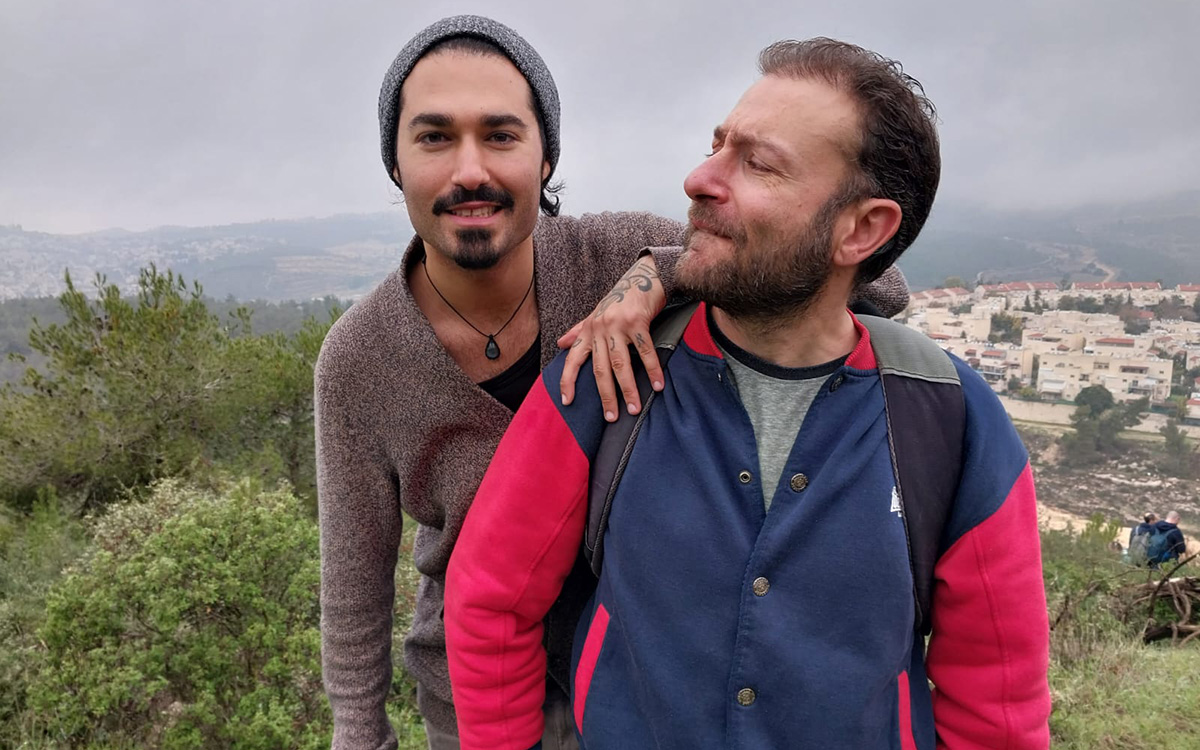
Many people will have to die for there to be equality
After Nati was killed, the two felt that the wedding was becoming more urgent. Ilan told the story of the wedding to his friends in the reserve battalion, and also told them about Nati, who was killed in the war.
“He told them that the wedding is now more urgent than ever, and that it is precisely now in this war that love should be celebrated, and his friends suggested that the wedding be held in the unit. Two days ago he came to me and asked: What are you doing on Wednesday? And I answered him that I was working. Then he asked me, do you want to get married? I told him yes and asked him if he was coming back from the reserves, and he told me: No. We will do it in the battalion.”
WDG: Did you felt complete with the choice?
ADAM: Ilan and his colleagues have been together for over a month. When I talk to him I hear them, and I hear him talking about them, they really became family. So although the wedding is spontaneous without my friends and family being able to come, it is being held with his family, who are actually the army and the friends from the reserves. And Nati will be there in spirit too. He died among soldiers, so we will feel his love among other soldiers who will be happy with us”
WDG: How does it feel to have a “military wedding”?
ADAM: This is not the wedding I expected, but I always told Ilan that I would marry him even inside a volcano. Everywhere. At the same time, this wedding has a lot of mixed emotions. This period is full of sadness and disappointment. The LGBTQ community is an equal partner in the national effort and the war, and its men and women do not receive equal status when they return home.
We could get married like everyone else but we have to do it in a crooked way with Zoom, and in no way, LGBTQ people are literally dead to protect us but no one counts them.
Ilan has been in service for a month and a half, and yet he had to find crooked ways to get married, feeling that he is worth less than other people, who don’t even join the army.
So for me this wedding is both defiance and pride. And this is the ambivalence. We feel a part and we sacrifice the most precious, and yet we don’t deserve to be married like everyone else and we are in a less good position. And yet we continue and get married in the middle of the war.”
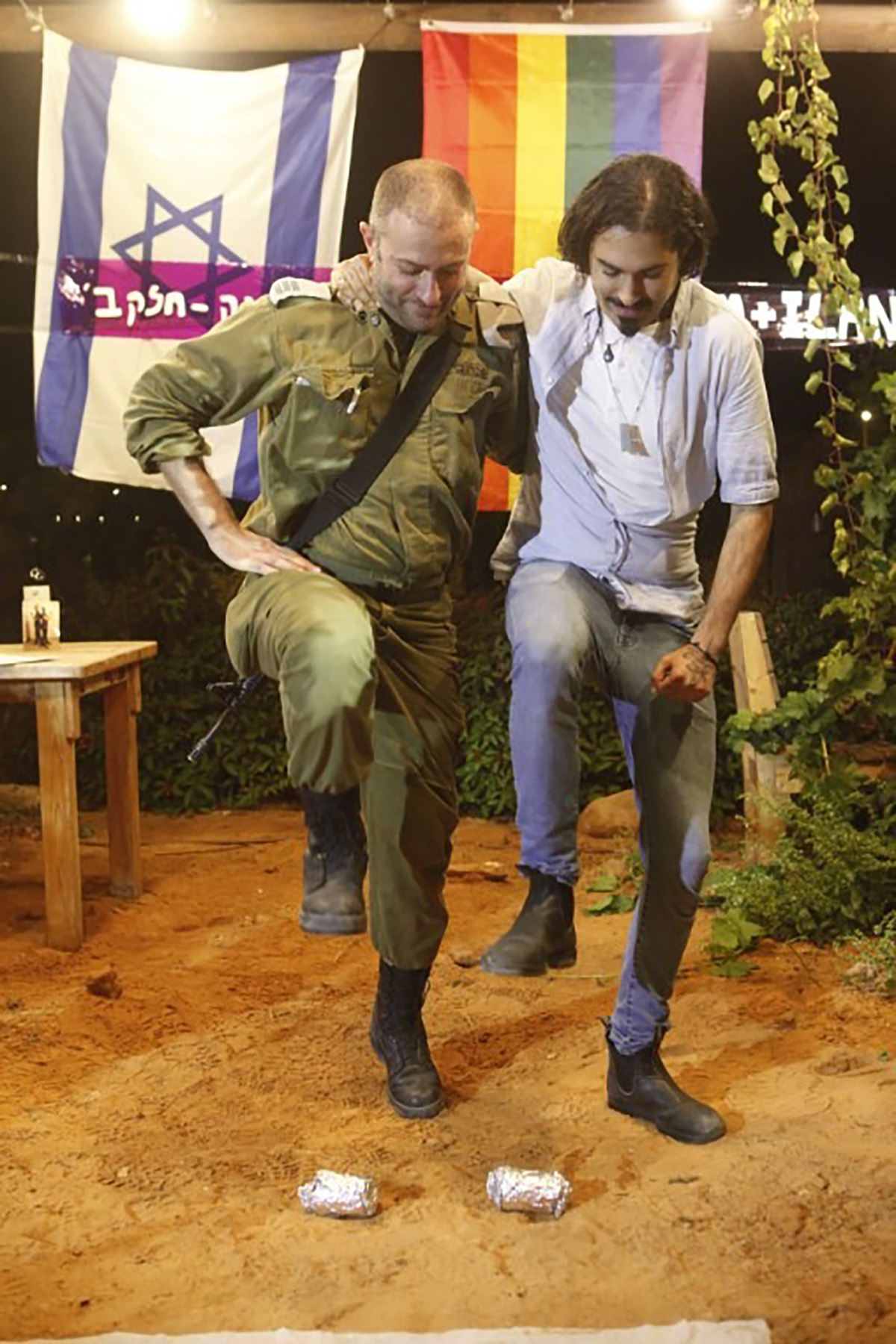
WDG: Do you think that following this period, which highlights the gap between what we give to the state and what we receive, a change will come?
ADAM: For Sagi Golan’s law, Sagi had to die. Part of his mate is dead too, I guess. I do believe that we will have equal rights, I believe that many people will have to die for it.
WDG: What is it like to live when your partner is so far from home for such a long period of time?
ADAM: Since that terrible Saturday when he was called I have been sleeping on the sofa. I can’t sleep in bed without him. There are long periods when he is without reception on the phone and I am constantly refreshing the pages of the news sites, to see if anything has happened. And when he returns home afterwards there is a tremendous feeling of momentary relief and an opportunity to be together for a bit. Even though as a volunteer in the LGBTQ help line, even when he goes out to retire from the reserves, he takes a shift and volunteers remotely.”
The couple and WDG would like to thank WILLOW – Zimmer in Arava, for volunteering to host the ceremony.

Advocacy groups are demanding the Trump-Vance administration not to deport two gay men to Iran.
MS Now on Jan. 23 reported the two men are among the 40 Iranian nationals who the White House plans to deport.
Iran is among the countries in which consensual same-sex sexual relations remain punishable by death.
The Washington Blade earlier this month reported LGBTQ Iranians have joined anti-government protests that broke out across the country on Dec. 28. Human rights groups say the Iranian government has killed thousands of people since the demonstrations began.
Rebekah Wolf of the American Immigration Council, which represents the two men, told MS Now her clients were scheduled to be on a deportation flight on Jan. 25. A Human Rights Campaign spokesperson on Tuesday told the Blade that one of the men “was able to obtain a temporary stay of removal from the” 10th U.S. Circuit Court of Appeals, and the other “is facing delayed deportation as the result of a measles outbreak at the facility where they’re being held.”
“My (organization, the American Immigration Council) represents those two gay men,” said American Immigration Council Senior Fellow Aaron Reichlin-Melnick in a Jan. 23 post on his Bluesky account. “They had been arrested on charges of sodomy by Iranian moral police, and fled the country seeking asylum. They face the death penalty if returned, yet the Trump (administration) denied their asylum claims in a kangaroo court process.”
“They are terrified,” added Reichlin-Melnick.
My org @immcouncil.org represents those two gay men. They had been arrested on charges of sodomy by Iranian moral police, and fled the country seeking asylum. They face the death penalty if returned, yet the Trump admin denied their asylum claims in a kangaroo court process.
They are terrified.
— Aaron Reichlin-Melnick (@reichlinmelnick.bsky.social) January 23, 2026 at 8:26 AM
Reichlin-Melnick in a second Bluesky post said “deporting people to Iran right now, as body bags line the street, is an immoral, inhumane, and unjust act.”
“That ICE is still considering carrying out the flight this weekend is a sign of an agency and an administration totally divorced from basic human rights,” he added.
Deporting people to Iran right now, as body bags line the street, is an immoral, inhumane, and unjust act. That ICE is still considering carrying out the flight this weekend is a sign of an agency and an administration totally divorced from basic human rights. www.ms.now/news/trump-d…
— Aaron Reichlin-Melnick (@reichlinmelnick.bsky.social) January 23, 2026 at 8:27 AM
HRC Vice President of Government Affairs David Stacy in a statement to the Blade noted Iran “is one of 12 nations that still execute queer people, and we continue to fear for their safety.” Stacy also referenced Renee Good, a 37-year-old lesbian woman who a U.S. Immigration and Customs Enforcement agent shot and killed in Minneapolis on Jan. 7, and Andry Hernández Romero, a gay Venezuelan asylum seeker who the Trump-Vance administration “forcibly disappeared” to El Salvador last year.
“This out-of-control administration continues to target immigrants and terrorize our communities,” said Stacy. “That same cruelty murdered Renee Nicole Good and imprisoned Andry Hernández Romero. We stand with the American Immigration Council and demand that these men receive the due process they deserve. Congress must refuse to fund this outrage and stand against the administration’s shameless dismissal of our constitutional rights.”
Iran
LGBTQ Iranians join anti-government protests
Nationwide demonstrations over economy began Dec. 28

Protests erupted across Iran on Dec. 28 as public anger over the country’s collapsing country spilled into the streets. Members of the LGBTQ community are among those who have participated in them.
What began as demonstrations over rising living costs soon expanded into broader political dissent, with protesters chanting anti-government slogans and, in some cases, directly criticizing Supreme Leader Ayatollah Ali Khamenei. Authorities later imposed internet restrictions and launched a nationwide crackdown, according to human rights groups.
According to Reuters, an Iranian official said authorities have verified at least 5,000 deaths linked to the unrest, including about 500 members of the security forces. The official blamed what the government described as “terrorists and armed rioters” for the killings, a characterization that could not be independently verified due to severe restrictions on media access and internet connectivity.
The same official told Reuters that the final death toll was not expected to rise significantly. The official also alleged that Israel and armed groups outside Iran had supported and supplied those involved in the protests, claims that could not be independently verified.
Multiple sources told the Washington Blade that LGBTQ Iranians have taken part in the protests against the government, despite the heightened risks they face under the country’s strict laws that criminalize consensual same-sex sexual relations.
Arsham Parsi, founder and executive director of International Railroad for Queer Refugees, is from Shiraz, a city in southern Iran. He fled the country in 2005.
Parsi told the Blade a widespread demand for dignity and freedom is driving the uprising.
“It is important to say clearly: LGBTQ people are part of Iranian society, and they are part of this protest,” said Parsi. “Many are participating directly, despite facing risks that are often even greater than others — because in Iran they are already criminalized and targeted simply for who they are.”
“For LGBTQ Iranians, showing up — whether publicly or in underground ways — can carry life-and-death consequences,” he added.
Parsi told the Blade that members of the LGBTQ community with whom he has been in contact described a mix of fear, exhaustion, grief, and determination. He added that many of them feel this moment differs from previous waves of protest in Iran.
“The scope, the persistence, and the public rejection of fear feel qualitatively different — and for that reason, many Iranians inside and outside the country are hopeful that this will lead to real transformation, including regime change, and that Iranians will finally regain their freedom,” said Parsi. “Freedom is not free, and Iranians are paying its cost with their blood.”
Parsi said the government’s response to the protests has been severe; citing widespread blackouts, internet shutdowns, telephone disruptions, and heavy security presence on the streets. He said the communication restrictions have made it increasingly difficult to document abuses, locate missing people, coordinate medical assistance or verify information, warning that such conditions can allow violence to occur beyond public view.
Parsi said his organization, along with other trusted groups, has been sharing harm-reduction guidance whenever possible, particularly on digital safety, avoiding identification and minimizing risk. He added, however, there is no fully safe way to protest under a system that criminalizes identity and treats dissent as an enemy, noting LGBTQ people, women, students, labor activists, and ethnic and religious minorities are among those facing the greatest danger.
“I also want to be very clear about what kind of international involvement we are calling for. We are against foreign military intervention. Iranians must determine Iran’s future. But we do need international aid and serious diplomatic engagement that is grounded in human rights — not convenience,” said Parsi. “In the past, too often, when Iranians rose up, parts of the international community were distracted by negotiations, ‘promises’ from the Islamic Republic, or short-term deals, and the momentum for human rights was abandoned.”
“We hope this time no one is fooled,” he added. “The regime is desperately trying to manipulate the narrative through state media and misinformation — to change the course of events and confuse the international community. The world must be smart, vigilant, and principled: do not reward repression with legitimacy, and do not trade away Iranian rights for empty assurances.”
Parsi said the unrest should also be viewed within a broader regional context, noting Iran’s actions beyond its borders have long drawn criticism from governments and analysts who accuse the country of supporting armed groups and contributing to conflicts that have harmed civilians across the Middle East. He said a future Iran that respects human rights domestically and pursues less confrontational policies abroad could have implications not only for Iranians, but for regional and global stability as well, adding many within the country continue to protest despite the personal risks involved.
Soudeh Rad, co-founder and executive director of Spectrum, a France-based NGO that works with Farsi-speaking communities on gender equality and LGBTQ issues, noted to the Blade the latest wave of large-scale protests began in Tehran’s Grand Bazaar. They said LGBTQ people, like other marginalized and underrepresented communities, often suffer disproportionate burden under systems of entrenched discrimination.
“Images and testimonials prove the fact that protestors are from all classes, ages, communities, ethnicities, genders, and even with different abilities. This is not a higher-class protest. Obviously, our LGBTQIA+ siblings, of all political tendencies and belongings,” said Rad. “As we can imagine, if their SOGIESC (sexual orientation, gender identity, gender expression, and sex characteristics) identity is revealed at the detention centers and prisons, they will be subject to a higher and more intense torture. Police and militia have not hesitated a moment to shoot protestors to kill them. Snipers have been spotted targeting people. Reported numbers of killed and injured people go as high as thousands.”
Rad said recent protest movements have produced gradual social changes in Iran even without formal legal reforms. They cited the “Women, Life, Freedom” movement, noting observers report growing noncompliance with compulsory hijab rules and increased solidarity among ethnic and long-marginalized communities that include Baluchis, Kurds, and Azeris. Rad described the current unrest as part of an ongoing process of social transformation.
Shadi Amin, a director at the LGBTQ rights group 6Rang, said the full impact of the crackdown on LGBTQ activists remains unknown, citing internet shutdowns and limited access to detention centers that have hindered documentation. She said LGBTQ people often face additional barriers to recognition as victims of human rights abuses, because discussions of sexual orientation and gender identity are frequently sidelined during periods of unrest. This omission leaves many cases unacknowledged or erased from public narratives.
Amin also pointed to Iran’s legal framework, under which consensual same-sex sexual relations remain punishable by death, as a key factor contributing to the long-standing invisibility of LGBTQ people.
She said the absence of official data makes it impossible to determine how many LGBTQ individuals may have been killed, detained or subjected to abuse during the protests, adding that this lack of recognition has persisted for decades. Amin told the Blade the internet shutdown has also severed regular communication between advocacy groups and LGBTQ people inside Iran, cutting off counseling services and daily contact that had previously provided limited insight into conditions on the ground. She said the loss of communication has made it increasingly difficult to assess the safety of individuals or confirm who remains in detention or has gone missing.
“I have spent almost my entire life fighting for freedom and democracy. Even if we have not yet achieved our ultimate goal, we have made life harder for our oppressors and safer for our community—and that in itself matters,” Amin noted to the Blade. “We seek change and have called for international intervention to uphold the responsibility to stop crimes against humanity, including through Responsibility to Protect (a U.N. principle adopted in 2005); however, top-down regime change or foreign military intervention would silence the movement.”
“In times of war, weapons — not people — have the final word, and social movements are pushed aside. This is one of our core concerns,” she added. “Another is the risk that even if the current regime is overthrown, it could be replaced by another form of dictatorship — such as a monarchic project represented by the son of the former shah, who has lived in the United States for nearly five decades and lacks democratic legitimacy.”
Amin said LGBTQ activists fear being overlooked amid the broader unrest, emphasizing concerns that ongoing repression and communication blackouts risk pushing LGBTQ experiences further out of public view. She said maintaining international attention remains critical for communities that are often forced into invisibility during periods of crisis.
Matt Forouzandy, president of the 30-Morg Queer Liberation Committee, an NGO focused on LGBTQ issues affecting Iranians inside the country and in the diaspora, confirmed LGBTQ Iranians have participated in the protests since they began.
He said some queer Iranians publicly expressed support for Crown Prince Reza Pahlavi on social media, sharing posts alongside Iran’s lion and sun flag, while acknowledging the risks they faced before joining demonstrations.
Pahlavi is the son of Iran’s last monarch, Mohammad Reza Shah Pahlavi, who was overthrown during the 1979 Islamic Revolution. Living in exile, he has in recent years emerged as a symbolic opposition figure for some Iranians abroad, though his role and influence inside the country remain contested.
Forouzandy said LGBTQ people inside Iran have, in some cases, participated more openly in the protests than many observers might expect, citing years of compounded repression under the regime. He said many queer activists use their real names and photographs on X and other social media platforms, rather than operating anonymously. Forouzandy added LGBTQ participants across different regions of the country have publicly expressed opposition to the current system.
Forouzandy said the future legal and civil status of LGBTQ people in Iran would depend on the political direction taken if the current system were to change, including whether outcomes reflect domestic demands or outside influence. He said some protesters have expressed support for a return to monarchical rule, arguing that such a shift could affect prospects for civil rights, though the outcome remains uncertain.
“Iranians in the diaspora — including LGBTQ+ individuals — are doing everything within their capacity to support those inside the country,” said Forouzandy. “However, the most decisive force remains the people inside Iran themselves. Their courage, determination, and collective will are what ultimately shape the outcome.”
“This is especially true for LGBTQ+ Iranians, who are fighting simultaneously for the liberation of their homeland and for full and equal civil rights within a future free Iran,” he added.
Iran
Grenell: ‘Real hope’ for gay rights in Iran as result of nationwide protests
Former ambassador to Germany claimed he has sneaked ‘gays and lesbians out of’ country

Richard Grenell, the presidential envoy for special missions of the United States, said on X on Tuesday that he has helped “sneak gays and lesbians out of Iran” and is seeing a change in attitudes in the country.
The post, which now has more than 25,000 likes since its uploading, claims that attitudes toward gays and lesbians are shifting amid massive economic protests across the country.
“For the first time EVER, someone has said ‘I want to wait just a bit,” the former U.S. ambassador to Germany wrote. “There is real hope coming from the inside. I don’t think you can stop this now.”
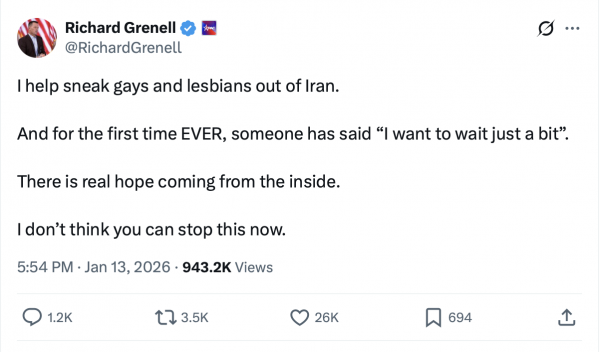
Grenell has been a longtime supporter of the president.
“Richard Grenell is a fabulous person, A STAR,” Trump posted on Truth Social days before his official appointment to the ambassador role. “He will be someplace, high up! DJT”
Iran, which is experiencing demonstrations across all 31 provinces of the country — including in Tehran, the capital — started as a result of a financial crisis causing the collapse of its national currency. Time magazine credits this uprising after the U.N. re-imposed sanctions in September over the country’s pursuit of nuclear weapons.
As basic necessities like bread, rice, meat, and medical supplies become increasingly unaffordable to the majority of the more than 90 million people living there, citizens took to the streets to push back against Iran’s theocratic regime.
Grenell, who was made president and executive director of the John F. Kennedy Center for the Performing Arts last year by Trump, believes that people in the majority Shiite Muslim country are also beginning to protest human rights abuses.
Iran is among only a handful of countries in which consensual same-sex sexual relations remain punishable by death, according to the Death Penalty Information Center.

